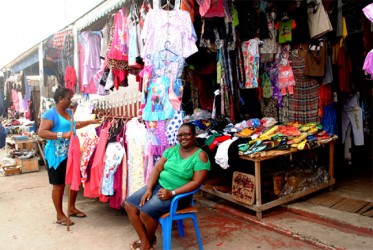On Monday, in the middle of the afternoon, the vendors trading in the Water Street Arcade were mostly sitting around outside their stalls, talking with one another, all the while, alert to the possibility of an isolated ‘sale.’ Exactly one month before Christmas there were few shoppers in the Arcade.
After more than five years of plying their trade in the rehabilitated facility they have grown accustomed to the seasonal lull in consumer spending that usually precedes the Christmas splurge. So they stock and they wait, all the while counting the days to what some of them say is usually a two-week period of seasonal madness. Those vendors occupying the 180 stalls that were erected out of the dilapidated facility which, up to around 2008 was an eyesore in the capital have come a long way, many of them from vending on the streets, a pursuit that placed them at odds with the City Police. When you ask them whether they consider their present circumstances to be an improvement on pavement vending they seem unsure. Just across the street other vendors have taken their places and from the relative quiet of the Arcade it seems to them that the walk by customers offer a considerable advantage.
The Arcade had been intended both to enhance the entrepreneurial prospects of the occupants and to help change the commercial culture, chiefly the congestion and controversy arising out of pavement vending. As it happened the completion of the Arcade had coincided with other developments in the urban trading culture; like the creation of a number of attractive stores, shopping malls and boutiques and the proliferation of Chinese traders against whom the local vendors say, they can never really compete effectively.
Other circumstances conspire to their disadvantage. The goods that they sell are bought from wholesalers and distributors, mostly on consignment. If they are to pay for stock and ‘make something’ for themselves every ‘sale’ counts.

On Monday we interrupted a small group of clothing vendors who were discussing plans for the imminent stocking of their shops in preparation for a hoped-for Christmas ‘rush.’ We learnt that some of them were banking on the exclusivity of what they would offer, relying heavily on consignments of imported clothing and anticipating that the uniqueness of what they would offer coupled with their own seasonal markdowns would increase their profit levels. Joy explained that in periods of high demand many vendors tended to push “one or two hot items” in the hope of making a killing.
Some of them talked to us about their stocking plans in more detail. The demand for clothing, they said would be high. Women, particularly, would be looking for ensembles with which to make statements at seasonal events. Casual clothing too, were good Christmas sellers though a lot of the real money was to be made in home décor and kitchen utensils, window blinds, sheet sets and bath towels. The real challenge, we learnt, was in arriving at a determination as to how to take their prices below those of the high street stores and still make a profit.
The emptiness of the beauty salons inside the Arcade were a dead giveaway. “Looking good” is one of the more significant seasonal investments and on Monday the empty ‘stations’ inside the beauty shops strongly suggested that consumers are yet to begin to take Christmas as seriously as they will in the days ahead.
The Arcade vendors have mixed views on whether or not the Water Street Arcade has been a business success for them. These days the pavements are no less congested with a new generation of street vendors who have been quick to take their places and even some of those who run businesses inside the Arcade still have interests on the streets. It is, they say, a matter of hedging their bets since the popularity of the Arcade cannot be relied upon to make a sustained living.
In large measure, business is a matter of patronage, sustained support from regulars. Walk-in customers help boost sales but the vendors inside the Arcade see themselves as being at a disadvantage when compared with the high street stores. “Everybody tries to sell everything these days,” Evangeline says. More than that, the Arcade vendors, mostly women, have grown used to employing generous measures of gentle persuasion to get a sale.
The experience of conventional trading has, over time, taught the vendors in the Water Street Arcade the value of effective marketing. It is their primary weakness, one which arises out of the logistical difficulties associated with advertising individual businesses inside a shared facility in circumstances where few if any of them enjoy any significant advantage associated with branding, for example. In the circumstances they hoped, they said, that their Christmas gift from our visit would be an appeal to consumers from the Arcade as a whole to “remember us” at Christmas. They want shoppers to make the Arcade a “shopping stop” in the remaining weeks before Christmas and, they say, they are ready to match and if possible, exceed the quality of service which the high street offers.






